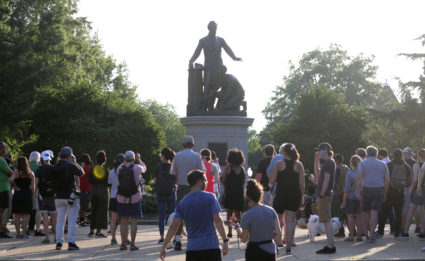
Often overlooked in America’s history of World War II are the 27 Tuskegee Airmen who disappeared in combat. Geoff Bennett…

Calls are intensifying for the removal of twin Emancipation memorials in Washington, D.C., and Boston that depict a freed Black American kneeling at Abraham Lincoln's feet — optics that jar and offend many in a nation confronting racial injustice through a fresh lens.
The Emancipation Memorial, also known as the Emancipation Group and the Freedman's Memorial, was erected in Washington's Lincoln Park in 1876. Three years later, a copy was installed in Boston, home to the statue's white creator, Thomas Ball.
Protesters gathered earlier this week to demand the removal of the original in Washington, where the Army activated about 400 unarmed National Guard personnel ahead of calls circulating on social media to tear it down Thursday evening.
And in Boston, where a petition is circulating for the copy to be taken down, the city's arts commission is holding public hearings Thursday and next Tuesday to discuss its fate.
What originally was intended in 1876 to celebrate liberation, critics contend, looks more like subservience and supremacy in 2020.
"I've been watching this man on his knees since I was a kid," said Tory Bullock, a Black actor and activist leading the campaign to get the Boston memorial removed.
"It's supposed to represent freedom but instead represents us still beneath someone else. I would always ask myself, "If he's free, why is he still on his knees?'" Bullock said.
The memorial has been on Boston's radar at least since 2018, when it launched a comprehensive review of whether public sculptures, monuments and other artworks reflected the city's diversity and didn't offend communities of color. The Boston Art Commission said it was paying extra attention to works with "problematic histories."
Black donors paid for the original in Washington; white politician and circus showman Moses Kimball financed the copy on a downtown square a block away from Boston Common. The inscription on both reads: "A race set free and the country at peace. Lincoln rests from his labors."
But Blacks weren't part of the design process, and the memorial's central visual takeaway — a Black man with broken shackles kneeling before his white savior, with a whipping post and chains in the background — has had people cringing for years.
"How can you say you care about Black lives and then leave a statue up for decades that actually promotes a disgusting and demeaning image of those very lives?" asked Lilian McCarthy, among more than 12,000 people who signed Bullock's petition.
Similar scorn has dogged the original in Washington since it was unveiled. At its dedication nearly a century and a half ago, abolitionist and Black statesman Frederick Douglass spoke critically of the freed slave's depiction as kneeling before Lincoln.
The memorial's defenders contend removing it is tantamount to erasing history.
"We haven't reached peak insanity, but setting an appointment to tear down an Abraham Lincoln statue known as the Emancipation Memorial in the name of racial equity has to be getting close," conservative commentator Rich Lowry said on Twitter.
But Eleanor Holmes Norton, the District's non-voting delegate in the U.S. House, said the monument ignores the fact that Black Americans played a pivotal role in securing their own freedom.
"Blacks too fought to end enslavement," Norton tweeted this week, saying she was introducing a bill to move the statue to a museum.
Sustain our coverage of culture, arts and literature.